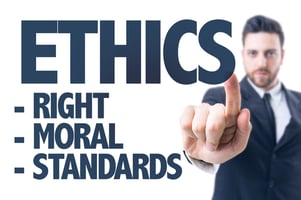What is Ethical Behavior? The concept of ethical behavior is often debated and can be interpreted...
What is the FCPA (foreign corrupt practices act)?
 What is the FCPA (foreign corrupt practices act) and what is its purpose?
What is the FCPA (foreign corrupt practices act) and what is its purpose?
The Foreign Corrupt Practices Act, or FCPA, is a law enacted by the United States Congress in 1977. The goal of this legislation was to make it illegal for any American company, individual or organization to bribe foreign officials. This blog post will explore what the FCPA is and how it impacts U.S.-based companies doing business abroad.
The FCPA prohibits corrupt payments either directly to government official (i.e., bribes) or indirectly through third parties (i.e., gifts). In order for an act to be considered a violation of the statute, four standards must be met: there must be an intent to influence the actions of a foreign official; there must have been reasonable knowledge that making payment could result in influencing those actions; the payment must have been made in furtherance of such intent; and, finally, the action sought to be influenced must have some direct relationship with the commercial interests of the United States.
The FCPA also includes provisions prohibiting the falsification of records, false representations to auditors or government officials, the failure to maintain adequate internal accounting controls, and the obstruction of investigations.
How does it impact businesses?
Compliance with U.S. law is not only important for individuals but also for international organizations doing business in the U.S. Congress recognized this and enacted the FCPA to enhance corporate compliance with the law by prohibiting giving anything of value to foreign officials for their own benefit or that of a third party. This is intended to promote honest and ethical business practices, combat global corruption and protect both United States citizens and businesses engaged in international trade or investment.
The FCPA is enforced by the Department of Justice through criminal and civil proceedings. Violations can lead to significant penalties including civil fines, asset forfeiture or even imprisonment.
How should businesses be prepared?
As with many laws, case law has helped to define the contours of what conduct falls within its scope. For example, the FCPA applies to more than just U.S.-based companies. It also applies to foreign firms listed on an American exchange, their subsidiaries and partners in joint ventures with them.
The implementation of compliance programs has been mandatory for publicly traded corporations since 1988; however, lawyers are quick to point out that simply having a written code of conduct does not mean that violations of the FCPA will never occur. A culture of ethical behavior must be emphasized and enforced within an organization to ensure that employees are fully aware of their responsibilities under the FCPA.
Why should companies be concerned about the FCPA?
The FCPA clearly demonstrates the United States' commitment to combat international corruption. The government of Brazil, for example, recently enacted a law that makes it illegal to bribe Brazilian public officials regardless of where the payments take place. Since Brazil is one of the fastest growing economies in the world, many U.S. companies are establishing new business interests there.
Even if your company is not currently operating in Brazil, it may be doing business with a foreign intermediary that is based there. If that entity then does something illegal for the benefit of a Brazilian official or party, you could be held accountable under U.S. law by association simply through your connection to them.
Similarly, because of the FCPA, companies must be careful when doing business abroad. It is important to know who you are dealing with and the relevant anti-corruption laws in that country. U.S. law expects organizations to take active steps to prevent corruption through due diligence reviews, internal controls and compliance programs that are tailored for specific countries or regions of interest.
What are some ways to avoid violating the law ?
The following are five basic steps to follow:
1. Know your business partners and avoid doing business with those who may be attempting to bribe officials or parties;
2. Conduct a due diligence review prior to entering into any agreement with a foreign partner, vendor or intermediary;
3. Implement an internal control system that is consistent with the FCPA;
4. Train your employees on what the FCPA requires;
5. Update your anti-corruption policies, procedures and training to comply with new developments in case law or foreign laws which may have a bearing on your organization's compliance with the FCPA.
The consequences of failing to follow these basic steps are serious. Recent enforcement actions by the Securities and Exchange Commission have resulted in a number of high-profile cases that have resulted in steep penalties.
There are additional steps to take when you actually begin operating in a new country, but these five actions can be implemented before your business endeavors even start.
Who enforces the law and what penalties do they impose ?
The Department of Justice is responsible for prosecuting companies and individuals who violate the FCPA. The S.E.C. may also seek civil penalties against violators in administrative proceedings. Another federal agency, the Office of Foreign Asset Control (OFAC), imposes separate penalties for violations involving U.S.-listed international terrorists and countries with which trade is prohibited, such as those designated by the State Department as state sponsors of terrorism. In addition, a company's business partners or other third parties may also be held liable if they fail to take action to prevent or report FCPA violations committed by their foreign affiliates.
The precise penalties that the government will seek in a given case depends on what authority the government is relying on to prosecute the case, and what type of violation a company has committed. For a more detailed discussion, please see our article in the Global Anti-Corruption Blog
How is the FCPA enforced?
It is important that corporations understand that they are subject to liability for corrupt activities not only in foreign countries, but also in connection with the purchase and sale of U.S. securities. Companies that enter into contracts or other transactions underwritten by a bank or broker-dealer may be subject to liability if an employee of the investment bank violates the law in the course of its anti-corruption activities.
What must companies do to avoid liability or mitigate damages following an FCPA violation or potential violation?
Conduct due diligence investigations. Not only is this the best way to make sure projects are compliant with U.S. law, these types of initiatives also help companies identify business partners who may contribute to a high-risk situation and provide early warnings about corruption risks in a market.
Companies should ensure that their internal anti-corruption policies are consistently followed. This includes regular training of employees, especially those involved in overseas operations or the due diligence process.
Companies should also establish a formal compliance program to manage risks related to corruption. Such programs should be tailored to meet the specific country risk profiles. They should include, among other things:
Developing and implementing programs to combat bribery is only the first step toward compliance. A company must then ensure that those programs are properly implemented, monitored and enforced. For this purpose, companies should designate appropriate staff—such as a Chief Compliance Officer (or equivalent position)—and delegate appropriate responsibility and authority for enforcing anti-corruption policies to such individuals.
Further, companies should have a system of internal controls in place to help identify potential issues and risks before they become problems. Internal controls are needed at all levels of the organization—from local management down to individual employees. The strongest anti-corruption programs generally include detailed policies that are communicated throughout the company to both managers and employees alike.
Is there a statute of limitations for violations of these regulations?
In the United States, a company may be subjected to civil fines for FCPA violations. In addition, U.S. authorities have the authority to seek imprisonment of officers and directors who participate in or facilitate a violation of the anti-bribery provisions of the FCPA. Under certain circumstances, a corporation itself can also face criminal charges for violations of the anti-bribery provisions of the FCPA. In addition, a company's business partners or other third parties may also be held liable if they fail to take action to prevent or report FCPA violations committed by their foreign affiliates.
The precise penalties that the government will seek in a given case depends on what authority the government is relying on to prosecute the case, and what type of violation a company has committed.
For instance, for purposes of imposing civil fines under the FCPA, the United States government will rely on one or more of three broad authorities: (i) general anti-fraud provisions; (ii) specific anti-bribery provisions; and (iii) the Travel Act. The penalty sought under each of these authorities is different, as explained below:
The United States has brought civil cases against companies almost every year since the FCPA was enacted in 1977. Many of those cases have resulted in large monetary settlements and fines—in many instances, exceeding $100 million.
With regard to the FCPA, what actions can companies undertake in order to mitigate potential liabilities?
A company's best defense against liability under the FCPA is a robust compliance program. A strong compliance program should include:
There are a number of things companies can do before an investigation or government inquiry begins in order to ensure that they will be able to respond effectively if they are faced with an inquiry. This includes, among other things:
Is the FCPA applicable only in cases where money or property is illegally transferred to a foreign public official?
No. The FCPA is applicable in two circumstances:
(i) when there is an improper payment to a foreign official; and
(ii) when there is an improper gift or entertainment of a foreign official.
The FCPA, in short, prohibits bribes paid to foreign public officials and bribes paid to other persons in order to obtain business with a foreign public official. The regulation also prohibits "anything of value," such as entertainment expenses, provided to a foreign official. In addition, the FCPA prohibits the payment of bribes to private persons for acts performed in furtherance of a corrupt business transaction.
What is a "foreign official"?
The FCPA applies to payments made or offered directly or indirectly to a foreign government official, political party or political candidate, and any person acting in a capacity of a government official, regardless of that person's title. The FCPA also applies to payments made or offered directly or indirectly to any person, while knowing that all or a portion of the money will be offered, given, or promised, directly or indirectly to an agent or employee of a foreign government official. The FCPA covers payments made to officials and employees of state-owned corporations.
What is a "foreign official" for purposes of the FCPA?
The term "foreign official" under the FCPA includes: (i) foreign government officials; (ii) persons acting in an official capacity on behalf of a foreign government; (iii) candidates for foreign political office; and (iv) persons affiliated with a political party. The FCPA also covers any person employed by an international business or serving as a proxy, representative, agent, nominee or similar representative of a foreign government.
What is the difference between a "foreign official" and a "foreign political party"?
The FCPA requires companies to perform a case-by-case analysis of whether an individual falls within the definition of "foreign official" before taking any steps to influence such individual's actions or decisions. A foreign political party, however, is defined as any party, two or more individuals whose efforts are devoted, directly or indirectly, to obtaining governmental power.
What is the difference between a "foreign public official" and a "government official?"
A foreign public official is an individual who holds or has held an elected, appointed or semi-appointed office of, or function with, a government of any foreign country (or political subdivision thereof), including the national government, provincial government, government-owned corporation, municipality or local government unit. A government official is an individual employed by a foreign country (or political subdivision thereof), including the national government, provincial government, any ministry of that country or agency of that country's central bank.
What are examples of "any person acting in a capacity of a foreign public official"?
The following categories of persons would commonly be considered to be acting in a capacity of a foreign public official: a candidate for a government office; an employee or appointee of the government; any person who is appointed to assist or aid a foreign public official while that individual holds himself out as being connected with that foreign government. In addition, a foreign government official can include any person who is responsible for receiving, accounting for, or paying public funds.
Are there any exceptions to the FCPA's prohibitions?
Yes, a company can pay a foreign official for travel expenses if the payment is reasonable and has legitimate business purpose with respect to that individual’s travel.
What business practices are subject to the FCPA?
The FCPA prohibits companies from undertaking any act or activity to corruptly influence, coerce, manipulate or mislead a foreign official (or to attempt to do so) in order to obtain or retain business or direct business to any person (or attempts thereof). The FCPA also prohibits any act of bribery to obtain or retain business. Regardless of whether they are considered "bribery" under the FCPA, it is important to note that any payment made in violation of another country's foreign corrupt practices law would be subject to criminal action under both US and international laws.
When does an individual become a foreign official?
An individual becomes a foreign official once he is elected, appointed or otherwise selected to perform some function with the government of another country. If the individual has not yet taken office, the US Supreme Court has explained that an "employee" extends to any person who “serves on behalf of” or “at the order or pleasure of” a foreign official. The US Supreme Court also has stated that an individual becomes a foreign public official when his employment is engaged with, "intertwined in any way" with governmental affairs.
What if the government official requests payment as part of their job?
The FCPA prohibits companies from offering, promising, authorizing or making corrupt payments to foreign officials. The law does not prohibit payment for public services or reimbursement of normal expenditures related to the business relationship. However, companies are required to have a legitimate business purpose in order to pay an official under these circumstances.
Can a company pay a foreign official’s normal and expected travel expenses?
Yes, the FCPA only prohibits offering payment to foreign officials for the purpose of influencing them; paying a company’s legitimate and ordinary expenses is not prohibited by the FCPA. However, companies are required to have a legitimate business purpose in order to pay an official under these circumstances. The company must be able to prove that the payment is reasonable and appropriate.
What payments and gifts are prohibited?
The FCPA prohibits companies from offering, making or authorizing a "thing of value" (payment) to a foreign official with intent to obtain or retain business. In addition, the FCPA prohibits any payments intended to influence an official to use his influence in order to affect or try to affect the official actions of a foreign government. Companies cannot bribe, offer any gift, payment, promise of payment (in kind) or reimbursement of such item given "for or because of" an official's action if it can be reasonably assumed that the company might influence the official. Similarly, companies cannot offer or make payment of a gift to an official if it can be reasonably assumed that the company might also influence the official.
What is a "thing of value?
A thing of value includes money, gifts and many other items. A thing of value does not have to be given directly to an official to be considered a violation of the FCPA. For example, if a gift or payment was offered to one person in order to influence another official's action, it could violate the law.
What are legitimate business expenses?
A "legitimate business" expense is an expenditure for goods or services necessary for conducting lawful activities of the company. These expenses are not prohibited by the FCPA. However, it is important to ensure that payments for legitimate business expenses fall within the reasonability of the amount and purpose given. In addition, companies must be able to provide evidence of a legitimate business purpose in order to show that an expense was reasonable and appropriate.
What type of FCPA violations generally occur?
The most common types of FCPA violations include: Bribery, including payments made to influence the recipient's actions on matters such as awarding contracts and resolving disputes; Payments for travel and entertainment of foreign officials; Promotion payments (when a company attempts to induce a government official to take favorable action by offering payment); Payments to consultants and advisors; Kickbacks (when a company demands or receives favorable treatment as consideration for payment made or offered to another); and Payments to third-party agents.
What are the laws that govern bribery?
Bribery is prohibited by international, federal and state law in the United States, including: The FCPA, which prohibits U.S. public companies from bribing foreign officials for business or offering a bribe as an inducement to obtaining or retaining business; The Travel Act, which prohibits U.S. citizens and permanent residents from knowingly structuring, facilitating, or concealing international travel in order to commit a crime of violence against another person outside the United States; and State statutes, which prohibit bribery including gift-giving, such as California Penal Code Section 67 (prohibiting giving a gift with intent to influence) and New York General Business Law Section 899 (prohibiting bribes).
Who is responsible for FCPA compliance?
Every individual at a company has an obligation to ensure that the company complies with the FCPA at all times.
What internal controls should be in place to prevent FCPA violations?
A variety of internal controls can help prevent FCPA violations, including: A written compliance program; Training for employees who deal with foreign officials; A process for documenting and approving transactions with foreign officials; and A process for maintaining accurate books and records.
What is the potential fine/penalty for FCPA violations?
A wide range of criminal and civil penalties can be imposed on companies and individuals for FCPA violations, including: Criminal fines of up to $2 million; Fines of up to 5 times the amount of pecuniary gain or loss; Forfeiture of all property that constitutes or is derived from proceeds of the offense; Seizure or denial of visas to individuals who are believed to have violated FCPA requirements; Possible debarment from government contracts; and Administrative penalties under federal agencies' regulations.
What is the statute of limitations for filing an FCPA complaint?
There are no statutes of limitations for criminal prosecutions of the FCPA. However, civil enforcement actions brought by the Department of Justice or SEC can be subject to a statute of limitations.
What other types of sanctions could be imposed for an FCPA violation?
The U.S. government could impose additional sanctions on companies and individuals involved in an FCPA violation, including: Denial of export licenses; Ineligibility to receive government loans, loan guarantees, and insurance; Refusal to certify firms for income tax benefits; and Denial of defense contracts.
Do the penalties apply to individuals as well as corporations?
Yes. Any company or individual found violating the FCPA's anti-bribery provisions is subject to criminal and civil penalties.
If you think you or your company may be under investigation for FCPA violations, contact an experienced attorney immediately . The Law Offices of Mark T. Hurt, PLLC , can help you evaluate the situation and develop a strategy designed to confront this serious matter in the most effective manner possible.
Conclusion :
The FCPA, or Foreign Corrupt Practices Act, is a law that aims to prevent American companies from bribing foreign officials. It has been in place since 1977 and there are still many questions surrounding what qualifies as bribery under the act. This regulation can be enforced by either an individual company's own compliance department or through external agencies like the SEC. Violations of this law may come with jail time for executives in addition to hefty fines if found guilty in court. You should consider looking into your business’s current practices relating to this legislation if you have any dealings abroad--especially when dealing with government contracts overseas which tend to attract more scrutiny than private sector deals do!
CLICK HERE to request a free (no commitment) online demo of your desired compliance training topics.




